Filter by
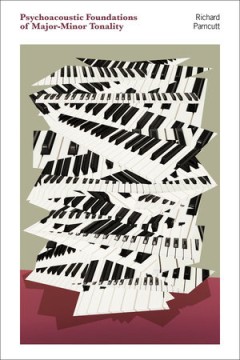
Psychoacoustic Foundations of Major-Minor Tonality
A fascinating interdisciplinary approach to how everyday Western music works, and why the tones, melodies, and chords combine as they do. Despite the cultural diversity of our globalized world, most Western music is still structured around major and minor scales and chords. Countless thinkers and scientists of the past have struggled to explain the nature and origin of musical structures. In…
- Edition
- Ed. 1
- ISBN/ISSN
- 9780262377362
- Collation
- -
- Series Title
- -
- Call Number
- 780.03 PAR p

Universe Unveiled The Cosmos in My Bubble Bath
The bubbles were swirling all around me, massaging my body. As I luxuriated in this fantastic bath, I gasped realizing that those bubbles carried with them miniature galaxies bringing the entire Cosmos into my bathtub... Alfie is back. And so are George and other characters from the author’s previous book Einstein’s Enigma or Black Holes in My Bubble Bath. While the present book, Univers…
- Edition
- -
- ISBN/ISSN
- 978-3-319-08213-4
- Collation
- -
- Series Title
- -
- Call Number
- -
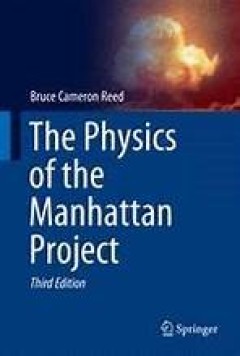
The Physics of the Manhattan Project
The development of nuclear weapons during the Manhattan Project is one of the most significant scientific events of the twentieth century. This revised and updated 3rd edition explores the challenges that faced the scientists and engineers of the Manhattan Project. It gives a clear introduction to fission weapons at the level of an upper-year undergraduate physics student by examining the detai…
- Edition
- 1
- ISBN/ISSN
- 978-3-662-43533-5
- Collation
- Fisika
- Series Title
- -
- Call Number
- 530

Herbert Fröhlich A Physicist Ahead of His Time
This biography provides a stimulating and coherent blend of scientific and personal narratives describing the many achievements of the theoretical physicist Herbert Fröhlich. For more than half a century, Fröhlich was an internationally renowned and much respected figure who exerted a decisive influence, often as a ‘man ahead of his time’, in fields as diverse as meson theory and biology.…
- Edition
- -
- ISBN/ISSN
- 978-3-319-14850-2
- Collation
- XXI, 263
- Series Title
- -
- Call Number
- 189 HYL h

Turing’s Revolution The Impact of His Ideas about Computability
This book provides an overview of the confluence of ideas in Turing’s era and work and examines the impact of his work on mathematical logic and theoretical computer science. It combines contributions by well-known scientists on the history and philosophy of computability theory as well as on generalised Turing computability. By looking at the roots and at the philosophical and technical infl…
- Edition
- -
- ISBN/ISSN
- 978-3-319-22156-4
- Collation
- -
- Series Title
- -
- Call Number
- -
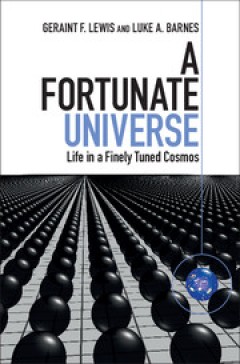
A Fortunate Universe Life in a Finely Tuned Cosmos
Over the last forty years, scientists have uncovered evidence that if the Universe had been forged with even slightly different properties, life as we know it - and life as we can imagine it - would be impossible. Join us on a journey through how we understand the Universe, from its most basic particles and forces, to planets, stars and galaxies, and back through cosmic history to the birth of …
- Edition
- -
- ISBN/ISSN
- 9781316661413
- Collation
- -
- Series Title
- -
- Call Number
- -

Treatise on Acoustics The First Comprehensive English Translation of E.F.F. …
E.F.F. Chladni’s experiments and observations with sound and vibrations profoundly influenced the development of the field of Acoustics. The famous Chladni diagrams along with other observations are contained in Die Akustik, published in German in 1802 and Traité d’Acoustique, a greatly expanded version, published in French in 1809. This is the first comprehensive translation of the expand…
- Edition
- -
- ISBN/ISSN
- 978-3-319-20361-4
- Collation
- -
- Series Title
- -
- Call Number
- -
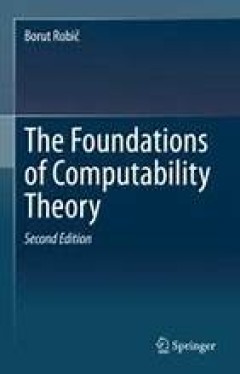
The Foundations of Computability Theory
This book offers an original and informative view of the development of fundamental concepts of computability theory. The treatment is put into historical context, emphasizing the motivation for ideas as well as their logical and formal development. In Part I the author introduces computability theory, with chapters on the foundational crisis of mathematics in the early twentieth century, and f…
- Edition
- 1
- ISBN/ISSN
- 978-3-662-62421-0
- Collation
- XXI, 422
- Series Title
- -
- Call Number
- -
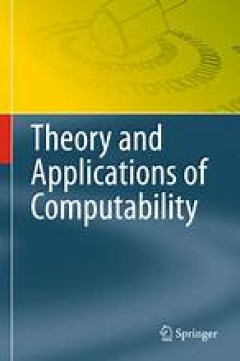
Programs as Diagrams
It is not always clear what computer programs mean in the various languages in which they can be written, yet a picture can be worth 1000 words, a diagram 1000 instructions. In this unique textbook/reference, programs are drawn as string diagrams in the language of categories, which display a universal syntax of mathematics (Computer scientists use them to analyze the program semantics; prog…
- Edition
- 1
- ISBN/ISSN
- 978-3-031-34827-3
- Collation
- XVII, 252, 1 b/w illustrations
- Series Title
- Theory and Applications of Computability
- Call Number
- -

Don Pigozzi on Abstract Algebraic Logic, Universal Algebra, and Computer Science
This book celebrates the work of Don Pigozzi on the occasion of his 80th birthday. In addition to articles written by leading specialists and his disciples, it presents Pigozzi’s scientific output and discusses his impact on the development of science. The book both catalogues his works and offers an extensive profile of Pigozzi as a person, sketching the most important events, not only relat…
- Edition
- 1
- ISBN/ISSN
- 978-3-319-74772-9
- Collation
- XXXIII, 454
- Series Title
- Outstanding Contributions to Logic
- Call Number
- -
 Computer Science, Information & General Works
Computer Science, Information & General Works  Philosophy & Psychology
Philosophy & Psychology  Religion
Religion  Social Sciences
Social Sciences  Language
Language  Pure Science
Pure Science  Applied Sciences
Applied Sciences  Art & Recreation
Art & Recreation  Literature
Literature  History & Geography
History & Geography